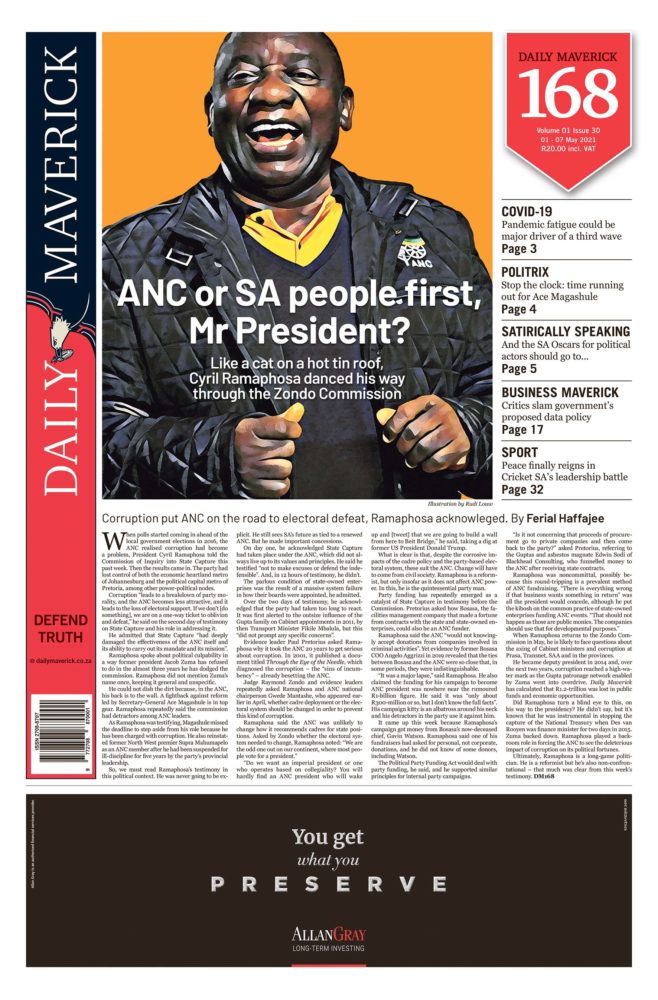First published in the Daily Maverick 168 weekly newspaper.
Like all complex questions, the reasons are multifold, and the fault lies, inevitably perhaps, with all parties; government, business and labour. And behind it all lies two deeper problems: greed and desperation.
I’ll get to that in a moment, but just to sketch the background: several recent incidents in labour relations, to me at least, are highly indicative. The first example is the letter sent by the National Union of Mineworkers (NUM) to the management of Eskom. The letter overall suggests a kind of militant cockyness that is just mind-boggling.
The headline demand is for a 15% overall increase. You have to pinch yourself a bit; there seems to be zero appreciation for the fact that the organisation is bankrupt. It’s not just bankrupt itself – that would be bad enough. It’s so bankrupt that it threatens the fiscal probity of the entire state.
It invites a kind of shocked disbelief to anyone unfamiliar with the modus operandi and mind-bending conceit of South African trade unions.
But this demand was only one of a whole string of demands on everything from shift increases, to worker loans, to increases in payment for shop stewards. (Yes, in SA, many companies do in fact pay people whose job it seemingly is to undermine their labour relations.)
There is lots that ordinary South Africans just don’t know about how labour relations in SA actually work, or do not. I remember a mining exec once telling me about the first time he attended a Chamber of Mines (now Minerals Council)/trade union bargaining session. He said it was amazing that the cars of the union representatives were newer, bigger and more expensive than those of the CEOs of the mines.
How can that be? The answer is that, in an effort to ensure labour peace, government and business opted for a “big labour” system shortly after democracy, essentially supporting large unions that, in the minds of business leaders, would “control” the workforce. The quid pro quo was that labour representatives involved would live high on the hog.
To say this has been a disaster would be to put it mildly. Inadvertently, this system has created a huge incentive for labour movement activists to go into the labour business, because winning a recognition agreement might be good-ish for workers, but for labour organisers, it’s like winning the lottery. It’s not about the worker. It’s about the union.
How does that happen? Well, the first thing unions do as part of their recognition agreements is negotiate a closed shop agreement and the automatic deduction of union dues. This means they get union dues even from people who are not actually part of the union. And often only one union is allowed.
In many parts of the world, closed shop agreements are illegal, because they lead to precisely the problems SA labour relations are experiencing: enormous battles for recognition accompanied by superviolent, inter- and intra-union battles.
And SA business just goes along with all of this. You search in vain for a business leader who openly says the bleeding obvious: this is all a horrible, unintended consequence of a system established with the best intentions that has now gone badly wrong. And the amounts of money involved are staggering. It’s not uncommon for a big mine to deduct tens of millions a month from workers’ salaries and hand that over to the union.
Normally, the government would eventually see the light, and tighten up these rules. But, for political reasons, the ANC is simply incapable of changing the labour environment, even to more or less approximate the stipulations of the International Labour Organization, which does not support closed shop agreements.
All of this is visible in a very interesting labour battle going on at the Blyvooruitzicht mine, where miners have already established an unaffiliated closed shop. In other words, the miners have already made up their minds. But that is not satisfactory to the NUM: think of all those union dues that could be coming into our pot? Of course, intimidation is rife, and workers say NUM-aligned people are breaking into houses and holding knives and axes to miners’ throats. Huge trees have been illegally cut down and thrown across the road to try to prevent the mine from operating – successfully, as it happens.
So the mine went to court, as they do. It won an injunction that prohibits violence, as they do. The mine took the injunction to the police to get enforcement. And the police do nothing, as they do. DM168
This story first appeared in our weekly Daily Maverick 168 newspaper which is available for free to Pick n Pay Smart Shoppers at these Pick n Pay stores.

















 Become an Insider
Become an Insider
Unions are their own worst enemies and for this reason, in rapid decline across the planet.